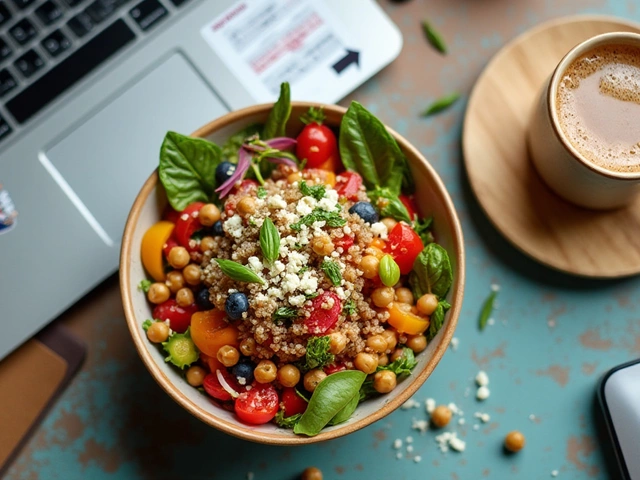
Exploring a plant-based lifestyle involves answering lots of questions, and one that often pops up is whether vegans can drink alcohol. The answer is more nuanced than you might think. Many alcoholic beverages are made using fruits and grains, which are inherently vegan. However, the production process can sometimes introduce animal products.
From the use of gelatin in wine clarification to honey in some liquors, not all alcohol is vegan-friendly. But don't worry! With a bit of knowledge and mindfulness, you can navigate through a range of vegan alternatives that allow you to enjoy your favorite drinks.
- Understanding Alcohol Ingredients
- Common Non-Vegan Alcohols
- Vegan Alcohol Brands
- Tips for Choosing Vegan Drinks
Understanding Alcohol Ingredients
When it comes to adopting a vegan lifestyle, every ingredient matters, even in beverages as indulgent as alcohol. At a glance, one might assume that all alcoholic drinks should be vegan-friendly beverages, given their primary ingredients are usually fruits, grains, and other plant-based materials. However, the devil is in the details – or rather, in the production processes that often involve less-than-plant-based methods.
Take wine, for example. While its core ingredients may just be grapes, the journey from vineyard to bottle can include the use of animal-derived products. Fining agents like gelatin, isinglass, and casein are often utilized to clarify wine by removing unwanted tannins and proteins. These agents, though removed before bottling, make the wine not suitable for a strict vegan. A similar story applies to some beers and ciders which use these agents for clarity and stability.
Hard liquors, or spirits, typically have a cleaner slate regarding non-vegan ingredients, but exceptions abound. Some flavored and spiced rums use honey or animal-derived colorants as part of their recipe. Then there's Baileys Irish Cream, which traditionally contains dairy, although they have branched into a vegan version using almond milk – a testament to the rising demand for vegan alcohol options. But it’s not all a guessing game; many producers are now more transparent about their ingredients and processes, responding to a more informed and increasingly discerning consumer base.
According to a study by the Vegan Society, "A significant portion of vegans feel alcohol producers must label products more clearly concerning non-vegan ingredients, thus allowing consumers to make informed choices."
This sentiment is echoed throughout the vegan lifestyle community, manifesting in collaborations between creators and consumers for more accessible transparency in the beverage market. So as consumer demand grows, researchers and producers alike are driven to innovate alternative methods that maintain product quality without using animal products. While it presents challenges, the results are heartening, with numerous brands leading the way in vegan-friendly drinks.
To aid in identifying vegan-safe options, various apps and online resources have sprung up, allowing bazillions of users to scan product barcodes for a quick check. In the absence of direct labeling, these platforms have become invaluable tools for the vegan community. Such resources encourage producers to highlight their vegan credentials, thereby not only simplifying choices for consumers but also fostering competition among brands to cater to this burgeoning market sector.
Recognize Your Ingredients
An understanding of basic alcohol ingredients and processes can empower you to make more informed choices. Most brands list ingredients on their websites even when they aren't explicitly stated on the label, and customer service departments can often provide clarity with a simple inquiry. Keeping an eye on vegan-friendly beverages lists and looking for endorsements from vegan organizations, such as the Vegan Society or PETA, can further steer your selections. Meanwhile, home experimentation with recipes for vegan cocktails or wines remains an adventurous and potentially rewarding avenue for those inclined to DIY.

Common Non-Vegan Alcohols
For anyone embracing a plant-based lifestyle, the hidden non-vegan components in alcohol can be surprising. While many presume their favorite drinks are purely plant-based due to the main ingredients like grains and fruits, the truth can be quite the shocker. The vegan lifestyle is not just about what you eat; it's about what you drink, too. Surprisingly, various traditional techniques in alcohol production employ animal-derived substances, thus sneaking unwelcome elements into your glass.
Take, for instance, the clarification process known as fining in wine production. To achieve that crystal-clear aesthetic, winemakers often use substances such as isinglass, which is derived from fish bladders, or gelatin, which may come from animal bones, skins, and tissues. Milk protein casein and albumin from eggs are equally common in this process, making much of the wine on the market unsuitable for vegans. It's not just about the potential residues; it's about the philosophy of not using animals in the production process at all.
Then there’s the case of some beers and ales. While the main ingredients of water, malt, hops, and yeast sound safe, similar fining techniques can be used here as well. Guinness, for example, historically utilized isinglass until 2017, when it transitioned to a fully vegan-friendly production method. As noted by Jack Norris, a co-founder of Vegan Outreach, "Even the most dedicated vegan might be unaware of how many drinks contain hidden animal products."
Spirits such as liquors also pose potential pitfalls. Honey, which is not considered vegan, finds its way into many flavored spirits like mead. Some craft distilleries incorporate animal-derived ingredients for unique flavors or textures, contributing to a non-vegan spirit lineup. The whiskey world isn't exempt either, as some distillers use animal products in the filtration process. Each of these issues highlights the importance of being aware of the distillation and filtration techniques used by the brands you support.
It's worth noting that the legal requirement for ingredient disclosure on alcoholic beverages is often not as stringent as other food products. This means consumers can't always rely on the label to provide full disclosure on whether their drink aligns with vegan standards. This semi-transparency often means vegans must do their own detective work, researching brands and production methods thoroughly.
"Transparency in the alcohol industry regarding animal use is still in its infancy, but with growing demand, more companies are leaning towards vegan certifications," says Emily V. Steinfeldt from the Vegan Society. This trend is a promising sign for those who wish to maintain their ethical commitments without sacrificing the pleasures of a social drink.
Understanding these intricacies allows consumers to make informed choices. Whether it's a night in with friends or a celebratory toast at a wedding, knowing the ins and outs of your drink is invaluable. The demand for vegan-friendly beverages continues to rise, pushing forward this wave of change, one sip at a time.

Exploring Vegan Alcohol Brands
Veganism is not just a diet; it’s a lifestyle choice that can extend into the world of alcoholic beverages. Many mainstream drinks, though seemingly vegan, often contain hidden animal ingredients, particularly in their production processes. That's where vegan alcohol brands come into play, ensuring that every sip aligns with a plant-based ethos. Explore these brands and you will find a world of flavors crafted with consideration for vegan values. From wines free of casein and isinglass to spirits that adopt animal-free filtration processes, the industry is witnessing a transformative wave of inclusivity.
One popular misconception is that all wine is automatically vegan because it is derived from grapes. However, many traditional wine-making methods use animal-derived agents. Thankfully, brands like Barefoot and FitVine, rising stars in the vegan wine arena, prioritize transparency by clearly labeling their products as vegan-friendly. These brands not only avoid utilizing animal by-products but often use sustainable practices in their vineyard management, offering a dual appeal to conscious consumers.
Spirits like whiskey and vodka also face scrutiny in vegan circles. Popular brands such as Tito's Vodka pride themselves on filtering without animal products, reshaping the perspective of vegan-friendly beverages. Tito's, in particular, uses traditional pot stills for distillation and avoids the use of glycerin, which can sometimes derive from animal fat. With such diligence, these companies contribute significantly to the inclusion of plant-based drinks in a variety of social settings.
Beer, often thought of as a safe vegan option, can also be problematic due to certain fining agents used in brewing. Yet brands like BrewDog have become champions of the vegan cause, ensuring their entire lineup is crafted without the use of animal-derived substances. Brewers like this often employ diatomaceous earth or mechanical filtration to clear their brews, bypassing the need for isinglass from fish bladders.
"Crafting vegan synthetization is more than a nod to market demand, it is a commitment to ethical practices enriching both our product and the planet." – James Watt, co-founder of BrewDog
To navigate the world of vegan alcoholic options, it's often helpful to start by identifying companies' missions and practices. Many top vegan alcohol brands are transparent about their commitments and often foster innovative approaches to traditional processes. Consulting resources like Barnivore—an invaluable database of vegan wines, beers, and liquors—can further aid in making informed decisions while expanding your palate.

Tips for Choosing Vegan Drinks
Being a vegan doesn't mean you have to give up your social life or your favorite drinks. It just requires a bit more attention to detail when selecting your beverages. The first thing to understand is that while many alcoholic drinks start with vegan-friendly ingredients like fruits and grains, the devil is in the details of production. For instance, during the fermentation process, many wines and beers use fining agents derived from animals, such as isinglass (from fish bladders), gelatin, or casein. These can quietly turn an otherwise plant-based drink into a non-vegan one. So, what can you do? Start by doing your research. Thanks to the digital age, information is more accessible than ever. Use vegan community forums and dedicated websites that offer up-to-date, comprehensive lists of vegan alcoholic brands and products.
Next, pay close attention to labels, even though alcohol labeling laws don’t always require full disclosure of ingredients. This can be tricky, but look for labels that are marked as ‘vegan’ or ‘vegan-friendly.’ Sometimes brands will proudly advertise their compliance with vegan guidelines, making your choice easier. It's also helpful to familiarize yourself with certain brands known for their commitment to vegan principles. Luckily, there is a growing number of producers that have made veganism part of their brand's identity. For instance, many craft breweries and vineyards opt to use non-animal alternatives, such as bentonite clay or activated charcoal, for the fining process.
Another solid strategy is reaching out directly to producers or checking out their websites for more information. Many brands are happy to provide detailed accounts of their production methods if you ask. As a consumer, your inquiry can even encourage more companies to consider adopting transparent practices. Remember, your best friend in this quest is the outstanding vegan community, where shared tips and experiences can guide you.
"The demand you're creating helps influence some producers to switch their practices," notes Jane Johnson, a renowned vegan culinary expert. "When more people ask questions, producers notice and consider alternative methods."
Exploring the variety of vegan alcohol brands is also part of the fun. Many breweries and wineries have taken note of the growing vegan community and have dedicated product lines that fit these lifestyle choices. There's a whole world of craft beers to explore that avoid isinglass, as well as an impressive range of organic wines that abstain from any animal derivatives. And let's not forget the distilled options; many vodkas, bourbons, and gins are naturally vegan, although it's worth checking the brand to be sure. It's a perfect time to experiment a little and find new favorites that align with your ethical compass.
Lastly, don’t be shy about sharing your commitment to vegan alcohol choices. Not only does this spread awareness, but it can also inspire others to choose more mindfully. Many bars and restaurants are increasing their vegan-friendly options, partly due to vocal patrons who express their preferences. When dining out, you can ask your server about vegan options or cocktails. Establishments are often willing to accommodate, and your input can be a catalyst for them to broaden their menu. With these strategies, you can be confident about enjoying your social scenes without worrying about compromising your vegan lifestyle.





